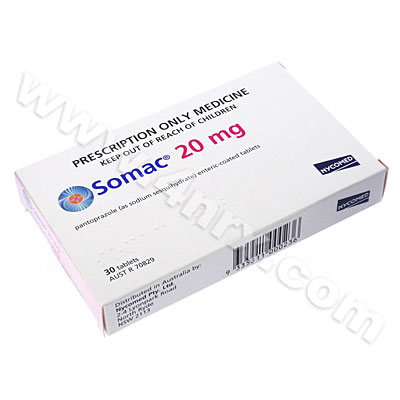 |
Home  Stomach Stomach  Somac (Pantoprazole Sodium Sesquihydrate) Somac (Pantoprazole Sodium Sesquihydrate) |
|
|||||||||
|
Somac (Pantoprazole Sodium Sesquihydrate)
What is Somac (Pantoprazole Sodium Sesquihydrate) used for? Somac (Pantoprazole Sodium Sesquihydrate) is used to treat and prevent peptic ulcers. It may also be used to treat gastroesophageal reflux disease, and Zollinger-Ellison syndrome. This drug acts on the stomach, and helps to decrease stomach acid production. It belongs to a class of medications called proton pump inhibitors. How should I use Somac (Pantoprazole Sodium Sesquihydrate)? Somac (Pantoprazole Sodium Sesquihydrate) tablets are normally taken with food, 1 to 2 times per day. This drug comes in the form of 20mg tablets and 40mg tablets. Your physician will tell you which one is required to treat your condition, and the correct dosage required. Do not take more than the prescribed amount. What are the side effects of Somac (Pantoprazole Sodium Sesquihydrate)? Side effects of Somac (Pantoprazole Sodium Sesquihydrate) include:
Other more serious side effects may also occur as a result of taking this medication. If you notice muscle spasms, seizures, fatigue or any other serious side effects, you should immediately consult your physician. Please Note This drug has been associated with an increased risk of Clostridium difficile-associated diarrhea. If you are taking this medication, you should be aware that some patients may be at greater risk of bone fractures as a result of taking this medication. Strictly follow all instructions provided to you by your physician or pharmacist while using Somac (Pantoprazole Sodium Sesquihydrate). Optimum and safe dosage can differ based on the patient and the condition being treated. As this medication may be unsafe for certain patients, it is essential you always inform your physician if you are pregnant or breastfeeding, as well as if you have any allergies, other illnesses, or ongoing health conditions, and if you are taking any other form of medication, supplements, or herbal products. Immediately seek emergency medical care if you have any allergic or hypersensitive reaction. Common signs of a reaction include hives, swelling, skin rashes, chest pains, as well as trouble breathing or swallowing. 

|
|||||||||||||||||